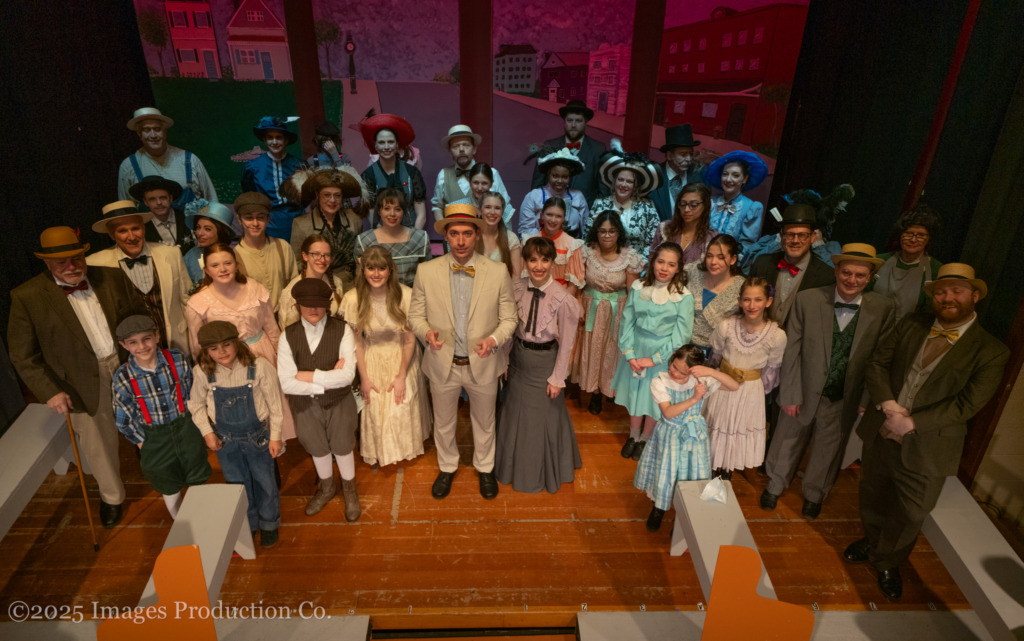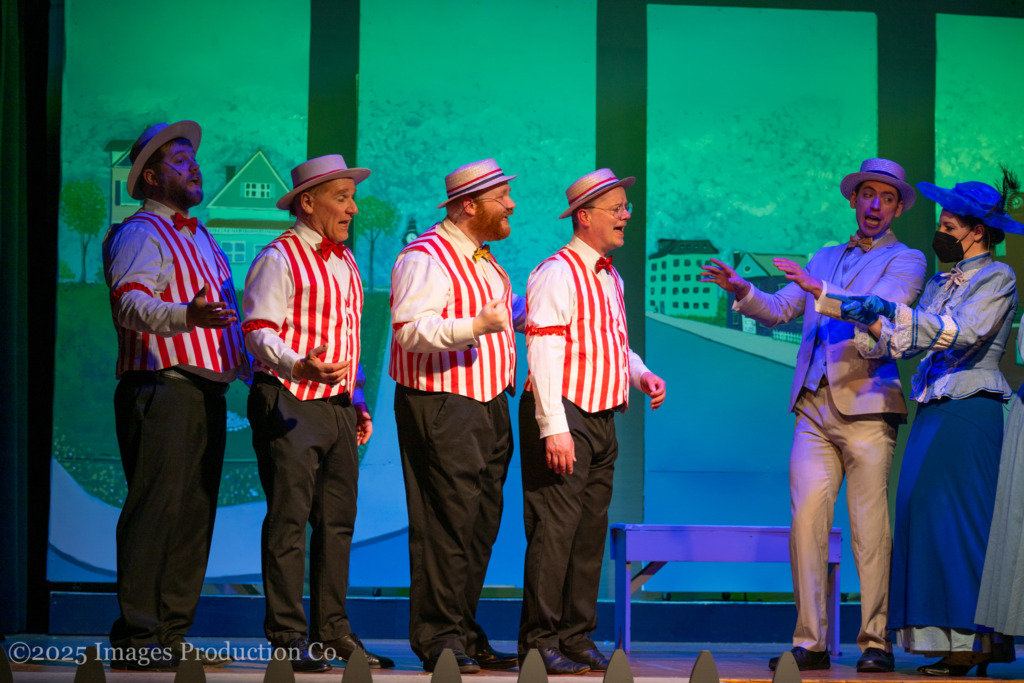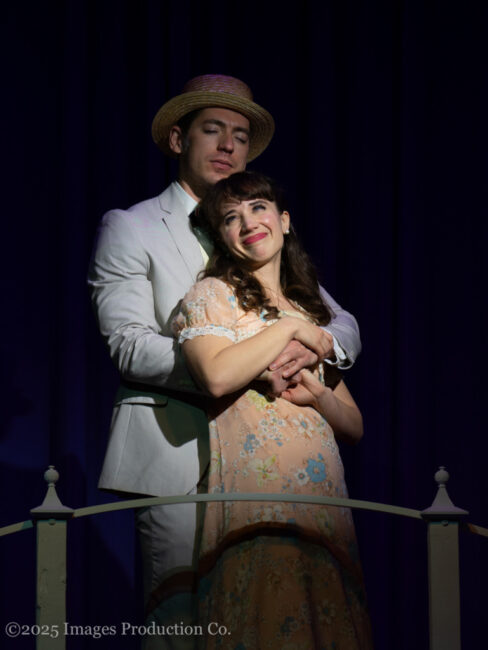Four venues and seven years ago— they had trouble! Right there in Bawlmer County. And they’re at it again! Further up here in Bawlmer County…which starts with a B and that rhymes with P and that stands for pool! Them rootin’ tootin’ gosh-darn Iowa-stubborn Third Wallers certainly know the territory! And they’re bringing you a rollicking good musical theatre classic— Meredith Wilson’s The Music Man. With 76 trombones! (Well…one trombone, played by Harry B. Swartz IV) And 110 cornets right behind! (Larry Engel on trumpet totally counts, right?) Directed & Choreographed by Jillian Paige with Musical Direction by Jeff Baker and Orchestra Pit led by Lynn Graham, this jaunty musical theatre chestnut features a strong ensemble, sensational leads, and a whole lot of heart.
Hats off to our technical production titans, Patrick & Amy Rudai— they really know the territory! Patrick Rudai serves as the show’s technical director in addition to master set-builder while Amy Rudai is the show’s lead set painter and costume master. (Both are assisted by Marc Graff and Caitlin Johnston, respectively.) Patrick Rudai has crafted glorious 4-sided periaktoi which Amy Rudai has painstakingly hand-painted in exquisite detail. You get Madison Library, Madison Gymnasium, River City’s Main Street and the interior of the Paroo household, each with vibrant details. And there are set pieces that flank the right side of the house (helping to further mask the orchestra pit!) showing iconic locations in River City, like the livery stable and Mayor Shinn’s Billiards Hall. Patrick Rudai has even crafted a glorious, functioning, red and gold Wells Fargo Wagon that rolls its way into town for the Act I finale. (If you sit on the aisles, that Wells Fargo Wagon might be bringing something special just for you!)

Amy Rudai really gets to showcase her handiwork in the myriad of period-appropriate costumes featured throughout the performance. The lavish dresses featured on Eulalie Shinn, the Mayor’s wife, in particular are incredibly praiseworthy. And Rudai has a lot of fanciful hats for the adult women, with delicate ribbon-bows for all the younger gals in the ensemble. When the school board quartet comes together? Matching red-striped barbershop vests complete with matching bowties and straw-boat hats! Rudai is sending Iowa City turn-of-the-century vibes out into the show’s sartorial ether and it’s a real beauty, especially for all of those lacey-long-leggings on the younger gals.
Sound balance continues to improve at Third Wall Productions, a combined effort between Sound Designer Charles Hirsch and Pit Conductor Lynn Graham. The pit is balanced and perfectly audible without overbearing, overplaying or overcoming the singers on stage. And the microphones, for the most part, were functioning as expected (a rare and impressive gem in most community theatre settings.) Lighting Designer Jim Shomo nearly understood the assignment, keeping things simple and natural. Until the rainbow explosion parade during “76 Trombones” and “Shipoopi”, which added to the already overly-stimulated choreographic intensity happening on the stage. To Shomo’s credit, despite the attempt at starlight for one of Marian’s solos (where the gobos looked like an exploded petri dish of fireflies rather than stars), for the most part, the lighting was balanced and served its purpose, particularly when the actors were moving on and off stage, up and down the aisle of the house and around the front of the stage’s apron.
Musically the show was delightful. Another combined effort— half Pit Conductor Lynn Graham (and her orchestra, featuring— Kevin Jones on bass, Ann Marie Cordial & Carrie Price on cello, Rachael Daudelin on violin, Jamie Kim & Stephanie Taylor on woodwinds, Larry Engel on trumpet, Harry B. Swartz IV on trombone, Patty Delisle on piano, Billy Georg on percussion) and half Musical Director Jeff Baker. Graham leads a fine orchestra through Meredith Wilson’s iconic score, keeping them level, well-balanced and blended. And the overall pacing of the show’s scene changes is so expedient, there’s hardly a need for any vamping from Graham and her pit. Jeff Baker encourages a hearty and robust ensemble, which really fortifies numbers like “Iowa Stubborn” and “The Wells Fargo Wagon.” Two of Baker’s most impressive feats are the opening number, “Rock Island” which isn’t ‘music’ so much as it is a race-paced patter where tempo, timing, and articulated patter are of the utmost importance and The Quartet, but we’ll get to them in a moment. The way Baker coaxes those men on the bench-train through that opening number is impressive. It doesn’t stutter, stammer, or falter, and everyone knows the territory of that complex opening sequence. As for The Quartet, they sound sublime. (Baker features as Jacey Squires, the top tenor of the four, which might have a little something to do with why they harmonize so perfectly.) When they come together for that first “say ‘ice cream’ but slowly” you know right then and there that every time they sing you’re going to get glorious magic in perfect four-part harmony.

Director Jillian Paige has done an impressive job streamlining scenes. The pacing of scene changes and the overall momentum of a production can make or break a show. And while there’s no getting around the fact that The Music Man comes in just shy of three hours (with that 15-20 minute intermission) because of being a product of its time, you never feel like you’re sitting around waiting for something to happen. Paige’s precision with bleeding scenes one into the next, scenery starting to move and shift as one moment is ending (and not waiting for another to begin, which is so often a huge mistake made at the community level) before the next begins really keeps the show blazing along. And all of the little details that Paige encourages amongst the cast— from leading player down to the young kids in the ensemble— really helps keep the audience engaged; you feel like you’re right there in River City, falling under the mesmerizing magic of the traveling sales man!
If there’s one thing about the show that falls a little uneven it’s the choreography. That’s not to say the choreography is bad, Paige— as a first time director, taking on a bear of a show whilst directing and choreographing without an AD or choreography assistant (as is sometimes the case at the community level) is doing her best. And there are moments that are really spectacular. About half of the time, the dancing is a little clunky and could benefit from another week’s run for polishing. And this is mainly the case for “76 Trombones” and “Shipoopi” the two big ‘dance numbers’ in the show. Though neither number is lacking in exuberant enthusiasm and energy. To Paige’s credit, she features an octet of charming young ladies dancing their hearts out as “piccolo kickers” (Amelia Berkebile, Cecilia May, Hope Standish-Pallanck, Andrea Rudai, Samantha Rudai, Victoria Rudai, Jenna Weiner, Maya Weiner) and gets Mrs. Squires (Beth Dixon) alongside Ethel Toffelmier (Samantha Jednorski) to cake-walk and leg-swing alongside Harold Hill in “Trouble.” Paige utilizes the strong dancing capabilities of her leading players— Harold Hill, Marian Paroo, Marcellus Washburn, and Ethel Toffelmier— during “Shipoopi” as well to spread the burbling and contagious glee of the number to the rest of the ensemble.
The aforementioned dancing octet are also some of the cartwheeling and split-dropping gals who get to showcase moves in “Shipoopi” as well. Those eight gals (Cecila May not withstanding as she plays Amaryllis) are part of the hearty River City ensemble (Amelia Berkebile, Hannah Brayton, Zarielle Casia, Sarah Chrzanowski, Aleksander Graff, Anastasia Graff, Krystyna Graff, Liam Hanson, Sarah Hartsock, Christopher Mike, Marita Mike, Richard Mike, Hope Standish-Pallanck, Jeanette Pallanck, Amy Rudai, Andrea Rudai, Samantha Rudai, Victoria Rudai, Patrick Rudolph, Nick Ruth, Jenna Weiner, Maya Weiner.) Enthusiasm, gumption, and loads of excitable spirit accompanies each ensemble member through the big crowd scenes and every toe-tapping crowd number, particularly when they’re all bopping along to “Trouble.” Props and praise especially to Jay Weiner, of the ensemble, taking up the role of Charlie Cowell— that pesky, no-good anvil salesman— just two nights before opening!

You get a very precious performance from the two youngsters, Winthrop (Walter Graff) and Amaryllis (Cecilia May.) Graff masters that adorable little lisp that the Winthrop character is known for and gets to showcase his vocal prowess during “Gary, Indiana” but where he really shines is with all those ‘do-I-hafta’ eyerolls that she gives to his sister Marian when she’s sending him off on his errand to the library. Cecilia May, as the spunky Amaryllis gives a great performance during her feature of “Piano Lesson” and in her little segment of “Goodnight, My Someone.” The pair are perfect for their roles and will have you grinning from ear to ear, especially Winthrop in that oh-so-delightful moment when he hands his jar of worms over to Marian. The two older kids, Zaneeta Shinn (Gray Jabaji) and Tommy Djilas (Gabriel O’Hara) are textbook 1910’s teens and both of these kids have a great handle on their particular phraseology. Jabaji in particular just has that perfect delivery of her “Egads!” and O’Hara’s interactions with Harold Hill are quite humorous. Keep your eye on that pair during “Shipoopi” as they get to ‘cut-a-rug’ right alongside the two main couples featured in that number and they do quite a good job of keeping up. And don’t overlook little Gracie Shinn (Alice Berkebile) who has her moment in the spotlight piping up against her hot-headed father, Mayor Shinn! It’s too cute for words.
Fusty, grumbling, cantankerous old hot head, Mayor Shinn (Gino Liberati) is the epitome of a grousing grandpa figure in this performance. Liberati’s ill-tempered outbursts are the perfect foil for the over-the-top theatrics of his wife, Eulalie Shinn (Maggie Stanley.) In her role of gracious airs…or better phrased… airs and graces, Stanley is a proper scream. She’s got the vocal affectation refined to a laughing tee, has all of the over-the-top gestures and personality pops exploding at exactly the right moment so that the audience can maximize their enjoyment of the character. Surrounded by her flock of pick-a-lil hens— Alama Hix (Lia Grady), Ethel Toffelmier (Samantha Jednorski), Maud Dunlop (Kay B. Rose), Mrs. Squires (Beth Dixon), and a few other River City Ladies (Amy Rudai and Sarah Chrzanowski)— the ladies of River City are quite the spectacle, especially when they’re trying to be Grecian Urns. You won’t be able to take your eyes off of Jednorski’s Ethel Toffelmier as she becomes the comic relief among the bunch, hilariously chewing scenery during that ‘dance practice’ scene where she’s spinning around and around and ends up facing her back to the audience and doing the whole routine facing backstage. There’s something comically inspiring about the ‘lights on; nobody’s home’ approach that Jednorski is taking with this character. The aforementioned hens come together like their group’s namesake for “Pick-a-Little (Talk-a-Little)” chirping and cheeping their way through that number with great aplomb.

“Lida Rose” and “Goodnight, Ladies” never sounded so smooth and sublime as it does in the hands of this quartet of school board members. Jeff Baker as Jacey Squires, Mitch Fishbein as Oliver Hix, Andrew Pedrick as Olin Britt, and William Zellhofer as Ewart Dunlop come together and create serene, syrupy sounds that just drift through those numbers effortlessly. Blended perfectly, balanced delectably; the quartet really is something. And keep your eyes out for Zellhofer at the top of the show as he bounces up and goes on a tear during “Rock Island” fussing all about Harold Hill; it’s pretty animated and very engaging.
You don’t get much for accents in River City, Iowa, (except for that one New Jersey citizen who drifted down on the orphan train and plopped herself right in the thick of things) it’s mostly about the patois and cadence and vocal affectation of the times. The exception here is Mrs. Paroo (Susan Liberati.) Subtle yet noticeable with her Irish accent, Liberati gives the character the down-to-earth grit required of Widow Paroo and holds her own in a good-natured vocal-spar-off with Marian during “Piano Lesson.” Liberati is quick with her timing too; delivering that ripe zinger about “The Think System” that really lands divinely and to much applause with the audience.
While Marcellus Washburn doesn’t come touting an accent, James Gilbert brings a curious refined quality to the character that can readily be overlooked. Vocally he holds his own, particularly when singing out in “Shipoopi” and he’s got a great dancing chemistry with Ethel Toffelmeir (Samantha Jednorski.) There’s a dapperness to Gilbert’s character, one that reads on the up-and-up, which makes it that much more fascinating when you realize he and Professor Harold Hill were once birds of a feather. And he dances well through “The Sadder-But-Wiser Girl” opposite Harold Hill as well.

Marian-Madam-Librarian-Paroo (Laura Hepp Saunders) can be a dull-as-dishwater-gooey-operatic-ingenue or a deeply complex character. Audiences at Third Wall Productions’ performance of The Music Man are in luck as Saunders approaches the Marian Paroo character as the latter. More than just frosty and frigid with Harold Hill upon first encountering him, you get the sense that she’s perpetually on her guard. Even when he starts swing-dancing her all around the library— the faces of utter revulsion, disgust, and ‘oh-god-why-am-I-here’ that Saunders pulls during those moments are hysterical. But they’re also nuanced because for a brief moment, she finds herself genuinely enjoying the dance but then quickly remembers where she is and who she’s with and those expressions of gross frustration slam firmly back into place on her face. Saunders is gifted with true operatic soprano sound, perfectly alighting on “My White Knight” and “Goodnight, My Someone.” She imbues these numbers not only with perfect sound and intonation, clear pitch and gentle vibrato when called for but with emotional depth; there is a longing present in “Goodnight, My Someone” and a deep self-doubt echoing through “Will I Ever Tell You?”
Saunders pairs spectacularly against Adam Goldsmith, who plays the titular character, and their volatile chemistry feels organic and pure. It’s progressive; the way he never gives up, the way she keeps trying to eschew his advances and escape his hoodwinking nonsense. When they sing together for “Till There Was You” it truly is the epitome of an iconic ‘heart-burst’ moment where all of that unresolved sensual tension just melts into the number in this perfect cinematic moment. It’s astonishing. Watching them play around during “Marian The Librarian” is as hilarious as it is clever and when she’s trying to give him the brush it’s equally humorous.

That Adam Goldsmith is a true spellbinder. He’s the only Harold Hill you’ll need or want to see all 2025-calendar year long. Slipperier than a Mississippi sturgeon, slicker than a Venezuela oil field, and more charming than the George Bailey from Bedford Falls, Goldsmith is an impeccable triple threat in the role, delivering the most nuanced performance of Harold Hill I can ever recall seeing in the decade and a half that I’ve seen some dozen more or more Harold Hills. There are complex layers to his character portrayal— right from the moment he pops up on the train you know he’s a Snake Oil Salesman ready to hustle you out of your last thin dime, but you’ll give it to him because of all that charisma and cheeky smile. When Saunders’ Marian goes off on her shrewish dismissal of him upon their initial encounter, there’s a moment where he’s just standing there gobsmacked, half in disbelief that his charms have failed to woo her and half in utter confusion as to how the heck he’s going to manage to deal with that. Every articulated second, Goldsmith is living and breathing in the skin of Harold Hill. You see it in his body language, in his facial expressions, and you hear it in his superb command of that 1910’s cadence when speaking. That moment with Winthrop— so heart-stoppingly human, where he says “I always think there’s a band, kid” is the pinnacle of performance for the character because he humanizes and not in that cheap, ‘throwaway ending’ way either.

Goldsmith is not only a sensational character actor, creating dynamic levels to explore within Harold Hill but he’s a wondrous dancer and extraordinary singer and patter-roller. You get to watch him lead the cast through “Trouble” and “76 Trombones” as if he were a natural dance-captain. And he’s got high-kicks that rival those Rockettes. Whipping his way through “Trouble”, Goldsmith keeps impeccable timing to the rhythm and tempo of the number but you still understand every single articulated word he’s rambling through. And there’s a bombastic bravado that charges up “76 Trombones” which spreads like wildfire to the boys and girls of River City as he engages them in this number too. You get a true sense of Goldsmith’s singing capabilities when he lays down that beautiful basement-bass-bari note for the quartet “ice cream” but he then showcases his vocal versatility by climbing sublimely up into a middle tenor sound, singing opposite of Marian in “Till There Was You.” There’s charm and cheek in “The Sadder-But-Wiser-Girl” and again perfect articulation. Goldsmith is nothing short of perfect in the role; hands down the most authentic performance anyone could ever hope to give in playing such a slick-n-seedy salesman.
As Harold Hill says, “…if you pile up enough tomorrows you’ll find you’ve collected nothing but a whole lot of empty yesterdays,” so make today count by getting tickets to see Third Wall Productions’ The Music Man; it’s an excellent show and well-worth attending.
Running Time: Approximately 3 hours with one intermission
The Music Man plays through February 16th 2025 with Third Wall Productions, in residence at Chestnut Grove Presbyterian Church— 3701 Sweet Air Road in Phoenix, MD. Tickets are available by at the door or in advance online.





